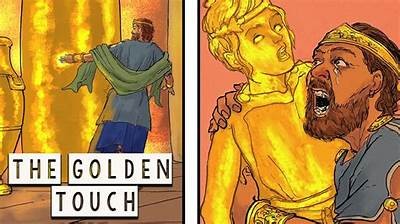The Enigmatic Tale of King Midas: The Man Who Turned Everything to Gold
The legend of King Midas is one of the most captivating stories from ancient mythology, rooted in the rich culture of Greece. It symbolizes the perilous nature of greed and the unforeseen consequences that come with the insatiable desire for wealth. This tale not only highlights the personal journey of King Midas but also serves as a cautionary narrative that resonates through ages taken by countless generations. In this extensive exploration, we will delve into the various facets of this legendary figure—his origins, the fateful wish, the consequences of that wish, and ultimately, his transformation into a figure of deeper understanding.

King Midas, often associated with the Phrygian kingdom, is a character that has evolved through various retellings. His story begins in a region steeped in richness, both in resources and culture. Midas was born to King Gordius, who was noted for his peaceful reign, and he inherited the throne at a young age. The land was flourishing, yet Midas yearned for more—not just for himself, but to elevate his kingdom to unimaginable heights of wealth and prosperity. This ambition began to form the foundation of his tragic destiny.

King Midas's love for gold became notorious, leading him to seek a boon from the god Dionysus. After showing kindness to Silenus, one of Dionysus’s satyrs, Midas was granted one wish of his choosing. In an impulsive decision driven by greed, Midas wished that everything he touched would turn to gold. At first, this wish seemed like a blessing, transforming his surroundings into a glittering spectacle of opulence.

However, the initial joy of Midas’s newfound powers quickly morphed into a nightmare. As he reveled in his treasures, he found that his ability to turn objects into gold was not as glorious as he had imagined. Simple pleasures turned bitter; the taste of food and the touch of loved ones turned into gold at his fingertips. His curse struck hardest when he embraced his daughter, transforming her into a gold statue. The overwhelming reality that he could not feed himself, could not enjoy any of life’s joys, weighed heavily on him.

Desperate to rid himself of the golden touch, Midas turned back to Dionysus, who took pity on him. The god instructed Midas to wash in the river Pactolus. As he submerged himself, the golden powers were washed away, leaving behind the inherent lesson of recognizing true values in life. Midas’s redemption lay not in material wealth but in understanding the importance of love, relationships, and the simple joys that life offers.

The story of King Midas serves as a timeless allegory, reflecting human nature’s ongoing battle with greed and desire. Throughout history, Midas became not just a figure of folklore but also a metaphor for those consumed by the pursuit of wealth—an eternal reminder of the importance of balance. The golden touch that turned his life upside down symbolizes the dichotomy of wealth: it can bring joy, yet it can also lead to isolation and suffering. Midas in Modern Culture
Even in contemporary society, the tale of King Midas finds resonance. The phrase "Midas touch" has evolved to represent individuals who excel in business or ventures, yet the original story serves as a stark warning against the pitfalls of excessive greed. Various adaptations in literature, film, and art showcase Midas as a complex character, and these portrayals often encourage audiences to reflect on their own values and the consequences of their desires. Conclusion
In conclusion, King Midas’s story captivates us not only as a mythic tale but also as a profound lesson about the nature of happiness and fulfillment. The journey from desire to despair, and ultimately to awareness, encapsulates the human experience, reminding us that wealth without purpose can ultimately lead to emptiness. As we continue to narrate the story of King Midas, we hold up a mirror to our own lives, contemplating what it truly means to be rich.
